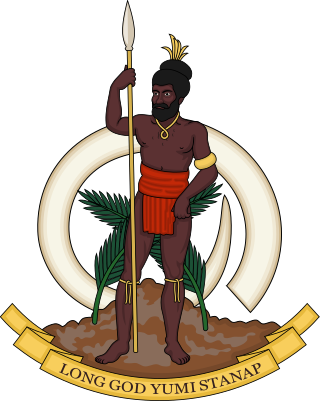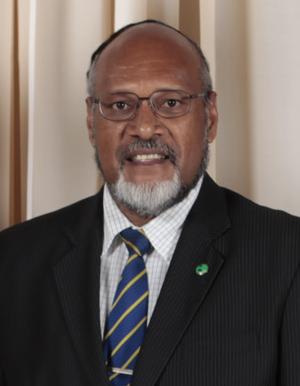
Vanuatu maintains diplomatic relations with many countries, and it has a small network of diplomatic missions. Australia, France, Japan, New Zealand, the People's Republic of China, South Korea and the United Kingdom maintain embassies, High Commissions, or missions in Port Vila. The British High Commission maintained a continued presence for almost a century, though closed from 2005 until reopening in 2019.

John Frum is a figure associated with cargo cults on the island of Tanna in Vanuatu. He is often depicted as an American World War II serviceman who will bring wealth and prosperity to the people if they follow him. Quoting David Attenborough's report of an encounter: "'E look like you. 'E got white face. 'E tall man. 'E live 'long South America."

Edward Nipake Natapei Tuta Fanua`araki was a Vanuatuan politician. He was the prime minister of Vanuatu on two occasions, and was previously the minister of Foreign Affairs briefly in 1991, the acting president of Vanuatu from 2 March 1999 to 24 March 1999 and the deputy prime minister. He was the president of the Vanua'aku Pati, a socialist, Anglophone political party.
The concept of Melanesian socialism was first advocated by Father Walter Lin̄i of the New Hebrides, who became the country's first Prime Minister upon its independence from France and the United Kingdom in 1980. Lin̄i's views on socialism were inspired by Julius Nyerere's experiments in African socialism in Tanzania.
The Battle of Kaba was fought at Kaba, Fiji, in 1855 between self proclaimed Fijian Tui Viti (King) Cakobau and his enemies from Rewa and Bau. In 1853, Cokobau had previously attempted to take the rebel positions at Kaba, in which he was brutally defeated. This time though Cakobau was supported by a strong fleet from Tonga, sent by Tu'i Tonga (King) Taufa'ahau of Tonga and Enele Ma'afu, governor of the Tongan population in Fiji. The battle was a major victory for Cakobau, thanks mainly to his Tongan allies, and cemented his leadership over Fiji. It also, however, underlined his dependency on the military power of Tonga, especially since Ma'afu remained in Fiji.

The Vavaʻu Code was instituted in Vavaʻu, Tonga in 1839, by King George Tupou I. It contained the country's first ever written laws, and formed the bases of the first constitution of the Kingdom. It delineated an ordered society where the monarch, chiefs, and subjects live in mutual obligation and also guaranteed the rights of the commoners for the first time. Along with the legal system it set up, the Code established the sovereign's intention creating a government "by law", one that is respected by the Europeans.

Fiji–Tonga relations are foreign relations between Fiji and Tonga. These neighbouring countries in the South Pacific have a history of bilateral relations going back several centuries.
Cuban-Pacific relations are diplomatic, economic, cultural, and other relations between the Cuba and countries situated in Oceania. In the 2000s, Cuba has been strengthening its relations with Pacific nations, which have, for the most part, responded favorably to Cuban medical aid in particular. The first Cuba-Pacific Islands ministerial meeting was held in September 2008 in Havana, with government members from ten Pacific countries—Kiribati, Tuvalu, Nauru, Solomon Islands, Fiji, Tonga, Vanuatu, Samoa, the Federated States of Micronesia and Papua New Guinea—attending. The meeting was a consolidation rather than a starting point of Cuban-Pacific relations.

Relations between Vanuatu and Cuba began shortly after the former gained its independence from France and the United Kingdom in 1980, and began establishing its own foreign policy as a newly independent state. Vanuatu and Cuba established official diplomatic relations in 1983.

The Soviet Union and Vanuatu established official diplomatic relations on 30 June 1986, three months to the day before Vanuatu established diplomatic relations with the United States.

Tonga and the Soviet Union established formal diplomatic relations in April 1976. Tonga was the first Pacific Island country to establish relations with the USSR.

Libya–Vanuatu relations refer to foreign relations between Vanuatu and Libya.

The French Republic and the Republic of Vanuatu have long-standing bilateral relations which have varied over the years between tense and amicable. Vanuatu, then known as the New Hebrides, was a Franco-British condominium from 1906 to 1980, and maintained formal relations with both of its former colonial masters after gaining independence. Franco–Vanuatuan relations were rocked by a series of crises in the 1980s, and broke down completely on several occasions, with Vanuatu expelling the French ambassador in 1981, in 1984 and in 1987. Relations improved from the 1990s onwards and, today, France provides development aid to Vanuatu. The two countries also share amicable economic and cultural relations; both are members of the Organisation internationale de la Francophonie.
Robert F. Van Lierop is a United States and ni-Vanuatu lawyer, diplomat, political activist, filmmaker, writer and photojournalist.

The Republic of Vanuatu has been a member of the United Nations since the year of its independence in 1980. The country was a particularly active member in the 1980s, when, governed by Prime Minister Father Walter Lini and represented by Ambassador Robert Van Lierop, it was a consistent advocate for decolonisation. Subsequently, its emphasis within the United Nations shifted to the issue of climate change and the vulnerability of Small Island Developing States.

The Kingdom of Tonga and the Union of Soviet Socialist Republics established formal diplomatic relations in April 1976. Tonga was the first Pacific Island country to establish relations with the USSR. The USSR was dissolved in 1991 and was succeeded by the Russian Federation as the successor state.

The Republic of Vanuatu and the Union of Soviet Socialist Republics established official diplomatic relations on June 30, 1986 - three months to the day before Vanuatu established diplomatic relations with the United States. With the dissolution of the Soviet Union in 1991, the Russian Federation emerged as its successor state in 1991.

General elections were held in Vanuatu on 30 November 1987. Ni-Vanuatu voters were invited to elect the 46 members of an expanded national Parliament, which had previously held 39 seats.

General elections were held in Vanuatu on 2 December 1991. Ni-Vanuatu voters were invited to elect the 46 members of the national Parliament.

General elections were held in Vanuatu on 30 November 1995. Ni-Vanuatu voters were invited to elect the 50 members of the national Parliament.












